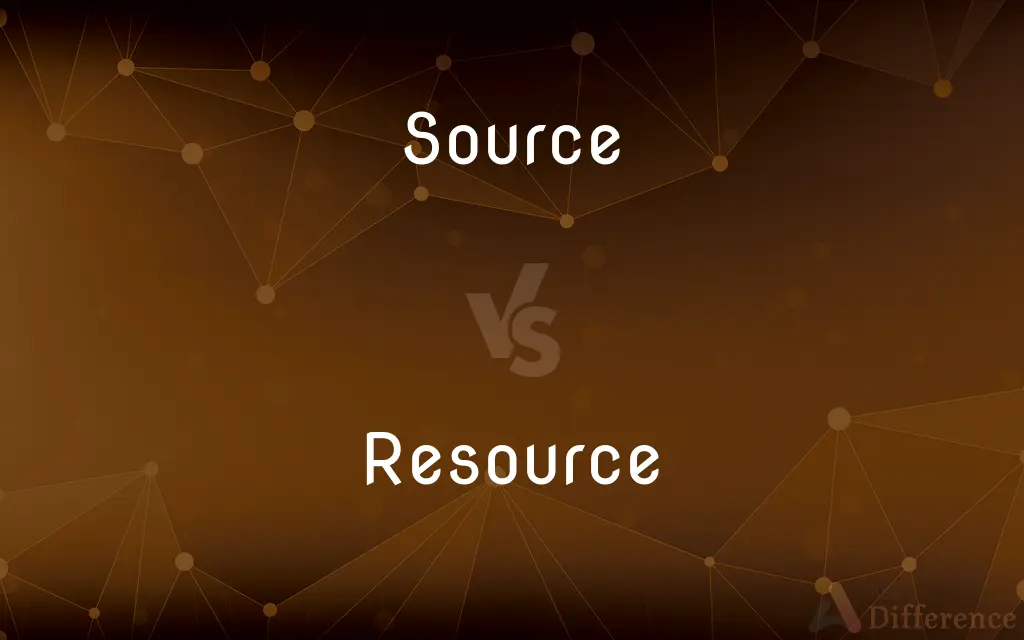Source vs. Resource — What's the Difference?
By Fiza Rafique & Maham Liaqat — Updated on March 12, 2024
A source is an origin or point of supply, while a resource is a stock or supply of money, materials, staff, and other assets that can be drawn upon.

Difference Between Source and Resource
Table of Contents
ADVERTISEMENT
Key Differences
A source refers to the beginning or origin of something, such as information, materials, or energy, indicating the point at which something originates or is obtained. For instance, a river might be the source of water for a community, or a scholarly article might be the source of information for research. On the other hand, a resource encompasses a broader range of assets, including materials, financial assets, human skills, and natural reserves, which can be utilized to achieve goals, solve problems, or create value. Resources imply availability and potential for use, such as financial resources for a project or natural resources like coal and oil.
The term "source" is often used in contexts where the focus is on the point of origin or acquisition. For example, in academic writing, citing sources is crucial for acknowledging the origin of ideas or data. Conversely, "resource" is employed in discussions about planning, management, and sustainability, emphasizing the utility and availability of assets. Resources are often categorized (e.g., renewable vs. non-renewable), reflecting their nature and how they can be managed or conserved.
In research and information gathering, a source is critical for verifying facts and understanding the basis of knowledge. It's about tracing back to where information came from. In contrast, resources play a key role in execution and operational contexts, such as in business or project management, where the focus is on utilizing available assets efficiently to achieve specific objectives.
The distinction also extends to personal and organizational levels. At a personal level, one might consider their skills or network as resources. At an organizational or societal level, resources can include infrastructure, workforce, and capital. In both cases, sources would be more specifically identified points or origins from which something is derived, such as a mentor as a source of guidance or a specific technology as the source of innovation.
Both terms are integral in strategic planning and decision-making. Identifying sources is crucial for understanding origins, dependencies, and credibility, while managing resources is essential for sustainability, efficiency, and achieving goals. The interplay between understanding sources and effectively utilizing resources is key in fields ranging from environmental science to economics and history.
ADVERTISEMENT
Comparison Chart
Definition
Point of origin or supply
Stock or supply that can be utilized
Focus
Origin or acquisition
Utility and availability
Contexts
Research, information gathering, energy
Planning, management, sustainability
Examples
Water source, information source
Financial resources, natural resources
Role
Verification, origin tracing
Utilization, strategic planning
Compare with Definitions
Source
The point where something begins or is obtained.
The library was the primary source for his thesis.
Resource
A supply or support available for use.
The team had limited resources for the project.
Source
Basis for energy or power.
Solar panels harness the sun as an energy source.
Resource
Anything that can be drawn upon when needed.
The book was a valuable resource for learning coding.
Source
Origin of information or materials.
The journalist traced the story back to its source.
Resource
Assets used to achieve goals.
Natural resources play a crucial role in the economy.
Source
Starting point of a river or stream.
They explored the source of the Amazon.
Resource
Human skills or expertise.
The community's greatest resource was its dedicated volunteers.
Source
Root or cause of something.
Miscommunication was the source of the conflict.
Resource
Materials or finances available to an individual or organization.
She managed the company's resources efficiently.
Source
A person or thing from which something comes into being or is derived or obtained
Alternative sources of energy.
The source of funding for the project.
Resource
Resource refers to all the materials available in our environment which help us to satisfy our needs and wants. Resources can broadly be classified upon their availability — they are classified into renewable and non-renewable resources.
Source
The point of origin of a stream or river.
Resource
Something that is available for use or that can be used for support or help
The local library is a valuable resource.
Source
One, such as a person or document, that supplies information
Reporters are only as reliable as their sources.
Resource
Often resources An available supply, especially of money, that can be drawn on when needed.
Source
(Physics) The point or part of a system where energy or mass is added to the system.
Resource
The ability to deal with a difficult or troublesome situation effectively; resourcefulness
A person of resource.
Source
To specify the origin of (a communication); document
The report is thoroughly sourced.
Resource
A means that can be used to cope with a difficult situation; an expedient
Needed all my intellectual resources for the exam.
Source
To obtain (materials or parts) from another business, country, or locale for manufacture
They sourced the spoke nuts from our company.
Resource
Resources The total means available for economic and political development, such as mineral wealth, labor force, and armaments.
Source
To outsource or insource (tasks or jobs, for example).
Resource
Resources The total means available to a company for increasing production or profit, including plant, labor, and raw material; assets.
Source
The person, place, or thing from which something (information, goods, etc.) comes or is acquired.
The accused refused to reveal the source of the illegal drugs she was selling.
Resource
Such means considered individually.
Source
Spring; fountainhead; wellhead; any collection of water on or under the surface of the ground in which a stream originates.
The main sources of the Euphrates River are the Karasu and Murat Rivers.
Resource
Something that one uses to achieve an objective, e.g. raw materials or personnel.
Source
A reporter's informant.
Resource
A person's capacity to deal with difficulty.
A man or woman of resource
Source
(computing) Source code.
Resource
Something that can be used to help achieve an aim, especially a book, equipment, etc. that provides information for teachers and students.
Source
(electronics) The name of one terminal of a field effect transistor (FET).
Resource
(networking) Hardware or software accessible by a computer, network, or another object connected to a computer.
Source
To obtain or procure: used especially of a business resource.
Resource
To supply with resources.
Source
(transitive) To find information about (a quotation)'s source from which it comes: to find a citation for.
Resource
To source anew or differently; to find or provide a new source for.
Source
The act of rising; a rise; an ascent.
Therefore right as an hawk upon a soursUp springeth into the air, right so prayers . . . Maken their sours to Goddes ears two.
Resource
That to which one resorts orr on which one depends for supply or support; means of overcoming a difficulty; resort; expedient.
Threat'nings mixed with prayers, his last resource.
Source
The rising from the ground, or beginning, of a stream of water or the like; a spring; a fountain.
Where as the Poo out of a welle smallTaketh his firste springing and his sours.
Kings that ruleBehind the hidden sources of the Nile.
Resource
Pecuniary means; funds; money, or any property that can be converted into supplies; available means or capabilities of any kind.
Scotland by no means escaped the fate ordained for every country which is connected, but not incorporated, with another country of greater resources.
Source
That from which anything comes forth, regarded as its cause or origin; the person from whom anything originates; first cause.
This source of ideas every man has wholly in himself.
The source of Newton's light, of Bacon's sense.
Resource
Available source of wealth; a new or reserve supply that can be drawn upon when needed
Source
The place where something begins, where it springs into being;
The Italian beginning of the Renaissance
Jupiter was the origin of the radiation
Pittsburgh is the source of the Ohio River
Communism's Russian root
Resource
A source of aid or support that may be drawn upon when needed;
The local library is a valuable resource
Source
A person who supplies information
Resource
The ability to deal resourcefully with unusual problems;
A man of resource
Source
A publication (or a passage from a publication) that is referred to;
He carried an armful of references back to his desk
He spent hours looking for the source of that quotation
Source
A document (or organization) from which information is obtained;
The reporter had two sources for the story
Source
A facility where something is available
Source
Anything that provides inspiration for later work
Source
Someone who originates or causes or initiates something;
He was the generator of several complaints
Source
(technology) a process by which energy or a substance enters a system;
A heat source
A source of carbon dioxide
Source
Anything (a person or animal or plant or substance) in which an infectious agent normally lives and multiplies;
An infectious agent depends on a reservoir for its survival
Source
Get (a product) from another country or business;
She sourced a supply of carpet
They are sourcing from smaller companies
Source
Specify the origin of;
The writer carefully sourced her report
Common Curiosities
How do you identify a reliable source?
A reliable source is typically characterized by credibility, authority, accuracy, and relevance to the topic at hand.
How can sources impact the credibility of information?
The credibility of information heavily depends on the reliability and authority of its sources; credible sources enhance information trustworthiness.
Can a source also be a resource?
Yes, in some contexts, a source can be considered a resource, especially if it is something that can be drawn upon or utilized, like a water source in agriculture.
Are resources always tangible?
No, resources can also be intangible, such as skills, knowledge, or digital assets.
What is the importance of documenting sources in academic work?
Documenting sources is crucial for academic integrity, allowing verification of facts and acknowledging the original authors of ideas and data.
What role do resources play in sustainability?
Resources are central to sustainability discussions, focusing on their efficient use, conservation, and renewal to support long-term ecological balance and human needs.
What strategies can be employed to manage resources effectively?
Effective resource management strategies include planning, monitoring, sustainable use, and continuously adapting to changing conditions or demands.
How do organizations assess their resource needs?
Organizations assess resource needs through strategic planning, analyzing goals, and evaluating current assets and capabilities against future requirements.
What makes a good resource?
A good resource is accessible, useful, and sustainable, effectively supporting the achievement of goals or solving problems.
How are sources and resources managed differently in a project?
Sources are managed by ensuring credibility and relevance, while resources are managed by allocating and utilizing them efficiently to meet project goals.
Can the internet be considered a source or a resource?
The internet can be both: a source of information and a resource in terms of its vast utility for communication, research, and services.
How does the concept of renewable resources differ from non-renewable?
Renewable resources can naturally replenish over time, like solar energy, whereas non-renewable resources, like fossil fuels, are finite and deplete with use.
In what ways can technology serve as a resource?
Technology serves as a resource by providing tools, platforms, and systems that facilitate operations, innovation, and problem-solving.
Why is it important to have diverse sources in research?
Diverse sources enrich research, providing a broad perspective and reducing biases, enhancing the reliability and depth of the findings.
How do personal resources differ from organizational resources?
Personal resources include individual skills, knowledge, and time, while organizational resources encompass collective assets like capital, workforce, and infrastructure.
Share Your Discovery

Previous Comparison
Dracula vs. Vampire
Next Comparison
Wolf vs. WerewolfAuthor Spotlight
Written by
Fiza RafiqueFiza Rafique is a skilled content writer at AskDifference.com, where she meticulously refines and enhances written pieces. Drawing from her vast editorial expertise, Fiza ensures clarity, accuracy, and precision in every article. Passionate about language, she continually seeks to elevate the quality of content for readers worldwide.
Co-written by
Maham Liaqat













































